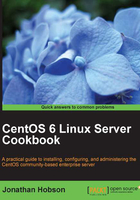
Conventions
In this book, you will find a number of styles of text that distinguish between different kinds of information. Here are some examples of these styles, and an explanation of their meaning.
Code words in text, database table names, folder names, filenames, file extensions, pathnames, dummy URLs, user input, and Twitter handles are shown as follows: "Again, if you experience any difficulties, simply check the logfile located at /var/log/maillog."
A block of code is set as follows:
include "/etc/named.rfc1912.zones";
zone "XXX.XXX.XXX.in-addr.arpa" IN {
type master;
file "/var/named/hostname.domainname.lan.db";
allow-update { none; };
};
Any command-line input or output is written as follows:
vi /etc/named.conf
New terms and important words are shown in bold. Words that you see on the screen, in menus or dialog boxes for example, appear in the text like this: "The second step is to choose the button labeled Configure Network (located in the lower-left portion of the screen) and use the resulting Network Connections dialog box to record any changes to your Ethernet settings."